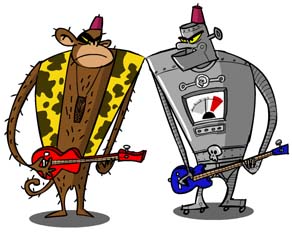The SpongeBob SquarePants theme tune by Monkey Versus Robot
Guess what? This was originally the theme tune to Spongebob Squarepants. (A popular animated television programme and a film).
He lives in a pineapple under the sea.

A Brief History of Cover Versions by Jonathan Lemon
“Wait, wait wait man. What in the world are you singing about? Don’t
you know this stuff is all out of date?” posed jazz trombonist Jack
Teagarden twenty seconds into his 1936 version of the corny standard “Sheik
of Araby”. The band then lurches into an altogether more laid back
and mellow version. In a nutshell this mischievous metamorphosis encapsulates
the cover version conundrum.
“Standards” was a term used to describe what we would now call a cover version. Hits were produced in the form of sheet music by talented songwriters locked away in tiny rooms in Tin Pan Alley. Performers picked the songs that would best show off their talents. It wasn’t until the sixties that bands started to perform their own songs. Sid Vicious sung “My Way” as his swansong but suddenly, if you didn’t write your own songs you were little more than a lounge act. Cover versions only existed as album fillers and encores. Then came the advent of the tribute album and the DJ re-mixes and "samples" in the late eighties when novelty and concept again came unto their own.
There are two types of cover version. The first is the often desperate attempt to emulate the magic of the original. This is encapsulated in the pop remakes of all those wonderful Motown and R&B classics that were “stolen” and popularized by a legion of untalented artists desperate for a cheap hit. Sadly, “Tainted Love” is better known as a Soft Cell song than the original Gloria Jones version. The art of cover versions hit a low when acts like Stars on 45 and Jive Bunny “re-mixed” medleys of chart toppers. Nowadays the “reproduction” template is used by retro/tribute bands and the commercially desperate only.
The second form of cover version is the reinterpretation of the original, often skewing its original intention and casting it in an entirely new light, ironic or otherwise. The Residents were in the forefront of this type of activity dedicating entire albums to their own unique versions of John Paul Sousa, Hank Williams and James Brown. In many cases the original songs were just a starting point on a journey that took the process into uncharted territory. It seemed that it didn’t matter how cheesy or obscure the original. The song writing was no longer about lyrics or chords. It was a different and refreshing approach—a recycling of sorts. Imagine if Shakespeare had translated Don Quixote. Or if instead of remaking Scooby Doo as a campy '70s throwback that appeals to Generation X-ers, Hollywood had instead changed it into a film noir starring Juliette Binoche and John Hurt. Now that would have been a great movie. Why then have so many people looked down at cover versions over the years? The answer is because people never did it for the right reasons. Now, however post-modernism is now in danger of becoming passé modernism. Tom Jones is singing Prince. Johnny Cash singing “Personal Jesus” when 20 years ago it would have been Depeche Mode singing “Folsom Prison Blues”. We all laugh when Rolf Harris does “Walk on the Wild Side” but bands like Nouvelle Vague now exist solely on the concept of recycling eighties hits in the style of Astrud Gilberto.
Under the criteria for this project there were two types of cover version to select. One was to go for the obscure. The other for the bizarre. The idea of the Beneath the Sea project as Monkey versus Robot understood it was to take something unexpected and shape it into something new and interesting. We toyed with the idea of something so utterly unknown (The TV theme “El Premio Ya Ganó” is very popular in Honduras but this CD will most certainly not be) but that takes away the reference point which would make—for example—“Too Drunk to Fuck” by Trini Lopez so irresistible. And who wants to be responsible for denying the world that pleasure? The Chiquita Banana commercial would have held an ironic political significance but as an instrumental would have required so much additional melody to be added that it would have been more like a sample than a cover version. Other songs are more production than composition. Some songs—“Teenage Enemy Nurses in Bondage” by Killer Pussy for example—are too sacred or perfect to be meddled with. There are also many songs that people remember for the wrong reasons (“Love Missile F1-11” for example) that “sound” like a great idea but if you actually did a cover version he joke would almost certainly be on you. The TV Theme “Chegger’s Plays Pop” would without doubt be in this category. The concept was to record the most un-surf song but at the same time—in the words of the usually asinine (Sir) Paul McCartney—take a bad song and make it better. In this way we make the world a more enlightening and beautiful place.
As a cartoon band we wanted to do a cartoon theme. Monkey versus Robot have a long association with soundtracks. In previous incarnations the band has dedicated entire albums to TV inspired sound, commercials and film music. Ironically nearly all the “classic” TV and film themes are basically surf instrumentals or are well known as surf instrumentals. Batman, Man From U.N.C.L.E., The Avengers, The Munsters, Z-cars, Mission Impossible, James Bond. We were looking for a tube tune that was as far from a surf instrumental as possible while retaining the element of cool. The original SpongeBob SquarePants theme is performed by pirates and the annoying yelling bratty kids that have been a staple of mindless run-of-the-mill kids TV songs since Howdy Doody first graced the screen scene. There is also a nautical theme that ties in as neat as a beat with the ubiquitous surf/hot rod/raw R&B/exotica instrumental genre. Yet SpongeBob is an interesting character. He embodies the underdog and the surreal. He lives in a pineapple under the sea. He embodies a non-macho, non-traditional underdog paradigm in the tradition of Stan Laurel, George Formby, Pee Wee Herman and Woody Allen. In short he deserves a better theme tune.
Monkey Versus Robot (a.k.a. Mono Contra Robot) are Jonathan Lemon and Pancho Doblado. They currently live in the steamy jungles of Honduras, Central America. They are currently working on a new CD called “Ping Island Voodoo”. Their website is www.pingisland.com
